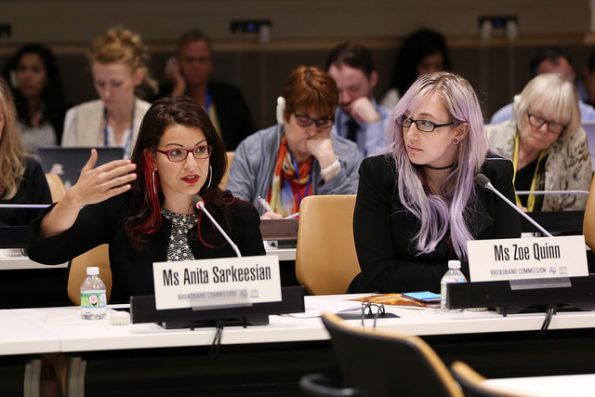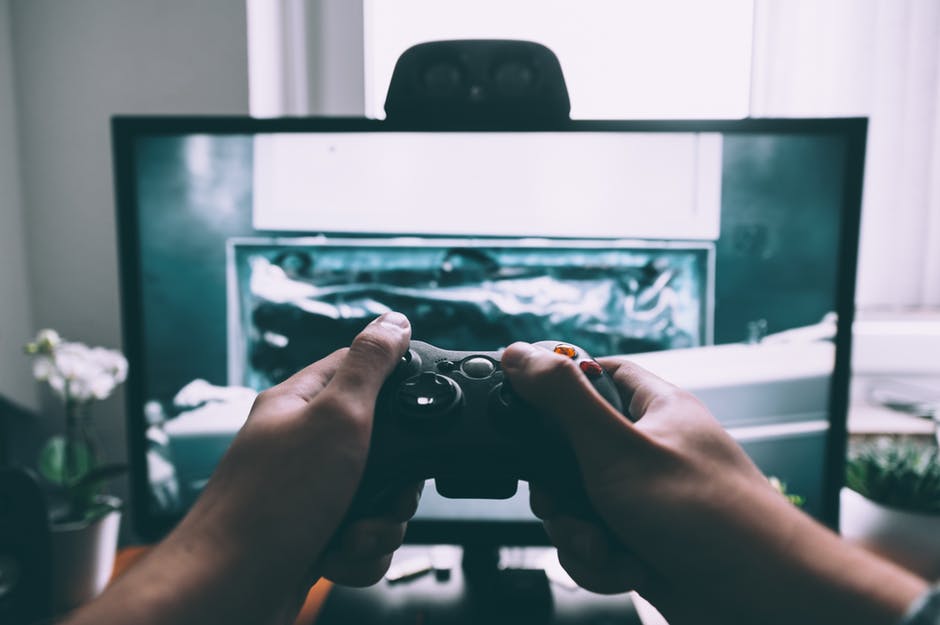In 1999 game developer, Rare, was hard at work on a new video game. The game, “Dinosaur Planet,” was to star a 16 year old heroine named Krystal. She could travel through time, fight monsters with her magical staff and save the world. She was strong, capable, talented and heroic. However, as the game neared completion game designer Shigeru Miyamoto suggested it be the third installment in his game series Star Fox adventures. And for the next several years, he and Nintendo worked to do just that. In the new game, the former protagonist Krystal was given a new role as the classic archetypal role of damsel in distress. Krystal spends most of the game frozen waiting for the new male protagonist Fox McCloud to save her.
Her new role, outfit and attitude objectify her and deprive her of the ability be her own hero. Feminist Frequency founder and advocate, Anita Sarkeesian uses games like these to prove her own belief in her video series Tropes vs. Women: “The belief that women are somehow a “naturally weaker gender” is a deeply ingrained socially constructed myth [that is] perpetuated [and normalized] when women are continuously portrayed as frail, fragile, and vulnerable creatures.” However, Anita refuses to let this be her own truth, making her a modern classic hero for her work critiquing the way women are portrayed in the media, particularly video games.
[embedyt] https://www.youtube.com/watch?v=kwZ_ECKYTcU[/embedyt]
(Video from StarFox Adventures of when Fox McCloud first meets Krystal)
Level 1
After studying feminist theory in school, Sarkeesian recognized the sexist way women are portrayed in the media. She started making videos and uploading them to youtube, critiquing pop culture for its sexist portrayal of women. In 2009, she got the idea for Feminist Frequency and her most successful miniseries Tropes vs. Women in videogames. To fund it she started her own kickstarter campaign asking if supporters have ever noticed that “basically all female characters in video games fall into a small handful of clichés and stereotypes.” She then proceeded to set a goal of $6,000- reaching it in less than 24 hours. Sarkeesian recognized a fundamental issue with the way women are treated in society, and challenged a social construct that has gone otherwise unnoticed. She was able to
campaign and fund it on her own, showcasing her pioneering strength. After reaching her goal, she began making videos and posting them on youtube. Harassment spiked as hardcore gamers recognized Sarkeesian’s goals and criticized her work. However, “Sarkeesian took screen grabs of the comments and posted them, which in turn drove more comments, and more people to contribute money on Kickstarter.” Ultimately she was able to raise $158,922 from nearly 7,000 backers within the 30 days it was open. Sarkeesian was able to use the negativity directed at her to propel her campaign. She willingly sacrificed her image and displayed the harassment to play on the sympathies of others, driving her campaign forward even further. Her incredible strength is showcased in her ability to take something essentially painful and make it a positive contribution to her case.
Obstacles
Anita may be doing great things for minorities in media but controversy surrounds her work. Since beginning her video series, she has been has been an target for abuse by an online group of young men that target female game developers and critics. This group, better known as gamergate, believes women like Anita are out to destroy video games and must be stopped. Despite the attacks targeting specific women, members of Gamergate argue they are not sexist but are simply concerned with “journalistic ethics in the online gaming press, particularly conflicts of interest between video game journalists and developers.” Members of gamergate believe they are protecting the gaming industry. If women like Anita succeed in changing games that already exist, they are violating the creators’ rights to free speech and future games will be edited to marginalize men. However, gamergate members have used their menist fears  to justify attacks on women that advocate for diversity in the gaming industry, like Anita. Using the anonymity of social media they have sent Anita “videos of herself being raped by video game characters” and death threats. Despite their claimed motives, Gamergate’s attacks to protect their first amendment rights have targeted only women and have been developed using their gender against them. Hate comments including rape threats and gender-based microaggressions expose the deep rooted problem with the media that Anita is already fighting. Gamergate’s reaction to female activists has further motivated and driven her campaign, allowing her to expand her advocacy to include sexism and abuse through social media. People can no longer ignore the fundamental issue with the way women are treated in the media.
to justify attacks on women that advocate for diversity in the gaming industry, like Anita. Using the anonymity of social media they have sent Anita “videos of herself being raped by video game characters” and death threats. Despite their claimed motives, Gamergate’s attacks to protect their first amendment rights have targeted only women and have been developed using their gender against them. Hate comments including rape threats and gender-based microaggressions expose the deep rooted problem with the media that Anita is already fighting. Gamergate’s reaction to female activists has further motivated and driven her campaign, allowing her to expand her advocacy to include sexism and abuse through social media. People can no longer ignore the fundamental issue with the way women are treated in the media.
[embedyt] https://www.youtube.com/watch?v=6yLXHZkH84I[/embedyt]
(An example of a game created by the gaming company Newgrounds in which the player clicks to beat up Anita in the smallest amount of time)
Level Up
Since starting Feminist Frequency, Sarkeesian has found success speaking at various conventions and conferences about the sexist portrayal of women in the media. However, not all are safe. For example, in 2014 a man threatened to instigate what would be “the deadliest school shooting in american history“ at the University of Utah if Anita held a conference addressing sexism in the video game industry. The messenger explained he would do it so everyone could “bear witness to what feminist lies and poison have done to the men of America” because “feminists have ruined [his] life.” Due to the rights to conceal and carry in Utah, Sarkeesian canceled her conference after receiving the threat. Many took it as an act of cowardice, but the courage she displayed in canceling the conference to protect the students is the greatest. She was encouraged by the campus to continue but the courage she exhibited in letting an anti-feminist win that small battle showcases how important this cause is to her. Furthermore, Anita continues to speak out against cyberbullying and tropes. Later in 2014, Sarkeesian was “doxxed, online slang for when a person’s personal information, such as phone numbers and bank data, are made public with an implicit invitation for further stalking” by the members of gamergate. This forced her to move and change contact information. However, she continues to host “lectures and [present] at universities, conferences and game development studios internationally.” Her courage is on full display as she opens herself up to more criticism even though she knows she can protect herself. Nevertheless, she continues to put herself out there and stand up for the causes important to her heart.

From Flickr by UN Women/Ryan Brown
Changing the Game
Her video series, tropes vs. women in videogames highlights the sexist treatment of women in games. Her series points out that the “roles most often available to women — from princesses to be rescued to prostitutes to be murdered — are both sexist and unimaginative.” Sarkeesian hoped that by focusing on tropes, or storytelling devices, through pop culture she could help viewers become more critical consumers of media. She argued that if women were given stronger roles, the gaming audience would expand and appeal to a more diverse audience as well as hold a more ‘creative class’. In 2009, she founded feminist frequency, a non profit organization meant to spread her message and organize support to change video games on a large scale. Her company was founded with the core “belief that media has the power to change the world.” Her company aims to “advocate for the just treatment of all people online and believe that media is an essential tool for eradicating injustice. Through consciousness-raising around issues like online harassment, [they] hope to cultivate new media literacies that will make us all more responsible media users in a just and more equitable virtual world.” She founded the company on her own and is continuing to make a difference in the world of video games. Feminist Frequency has earned a reputation and successfully highlighted storytelling tropes like the damsel in distress. They have forced gaming companies like Nintendo to look at games with a more critical eye, to recognize storytelling devices and cliches that they have not before. Anita’s companies and campaigns have literally changed the game.
End Credits
The ESA reports that the proportion of women playing all video games on video game consoles, tablets and other devices has grown to 45 percent. And of the women involved in online gaming approximately 70 percent play with male avatars. Women are undoubtedly a minority in games and consequently not the target audience. However, by belittling women in the media, the creators are insinuating that women are not heroes. They insinuate that women are simply plot devices to masculinize male avatars. Anita is a hero because she realizes that she deserves to be one. She recognizes that women should have the option to be the hero of their own story. Anita is revealing to everyone: creators, financiers and gamers that it is more than just a game.
[embedyt] https://www.youtube.com/watch?v=QC6oxBLXtkU[/embedyt]
(An episode from her video series, Tropes vs. Women in Video Games)
Featured image from Pexels by Unsplash





Evan
“Gamergate” was a big turning point in the gaming industry, not for changing the game, but realizing its the players who choose to buy things, or don’t. With games like Call-of-Duty and Battlefield, you haven’t seen many female leads, but there have been a few. Just like the real military, female presence is not very high, so you cannot expect a very high amount of roles if you want a fairly realistic Jetpack Exo-suit COD.
If you truly want to get rid of the “cliche” standard of how women are portrayed in society, then push for full equality in all areas. Like, try to pass a bill so females will be drafted into the military during a draft call, or even push for equal charges for a woman hitting a man. There are a lot of other things you can change on both sides for proving equality in society instead of going after a video game.
If you look at the movie Ghost Busters “Answer the Call” was a feminist movie remake that was a huge flop, costing 144 Million and only grossing 46 Million its first week. Really showing that people don’t want to go to a movie and be told to like it, or be told its progression. People don’t want to watch politics while trying to be entertained unless they are watching John Oliver. If you naturally push them to the main character no one will care, but if you make it a point to shove them down the public’s throat then you can expect them to be off-put. That is what happened in the gaming industry if you force someone to do something they will not enjoy it. But if you let them go to it naturally it will spread and be widely accepted. But no gamer really cares who the main character if the game is enjoyable and makes them want to play it again.
-(Great Video on Gamergate) https://www.youtube.com/watch?v=r3r0atokQvc (Milo Yiannopoulos).
-(Ghost Busters flop) http://deadline.com/2016/07/ghostbusters-weekend-box-office-1201787149/